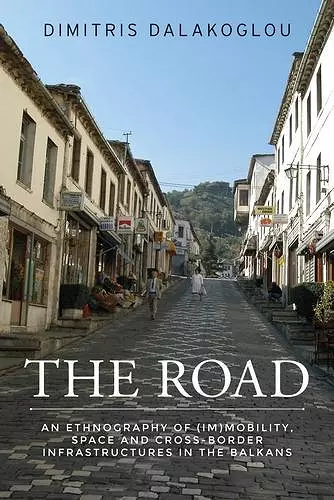The Road
An Ethnography of (Im)Mobility, Space, and Cross-Border Infrastructures in the Balkans
Format:Paperback
Publisher:Manchester University Press
Published:6th Feb '17
Should be back in stock very soon

This book is an ethnographic and historical study of the main Albania-Greece highway. But more than an ethnography on the road, it is an anthropology of the road. Highways are part of an explicit cultural-material nexus that includes houses, urban architecture and vehicles. Complex socio-political phenomena such as EU border security, nationalist politics, post-Cold War capitalism and financial crises all leave their mark in the concrete. This bookexplores anew classical anthropological and sociological categories of analysis in direct reference to infrastructure, providing unique insights into the political and cultural processes that took place across Europe after the Cold War. More specifically, it sheds light on political and economic relationships in the Balkans during the socialist post-Cold War period, focusing especially on Albania, one of the most under-researched countries in the region.
'Before reading this research I could not have begun to imagine the sheer range of profound insights that anthropology can bring to this single object - the road. For Dalakaglou a road connects so much more than just two places; it becomes sometimes the conduit and sometimes the barrier between political regimes, social and economic structures, the livelihoods of people, ideologies and beliefs, history, time and fortune.'
Daniel Miller, Professor of Material Culture, University College London
'Roads are simultaneously intrusive of bounded spaces and enabling of mobility; they thus challenge social scientists’ assumptions about structures and forms. By engaging the peculiar circumstances of road use in Albania, a country hitherto largely closed to the traffic of ideas as much as of people but today rapidly both absorbing and infiltrating the global dynamics of change, Dimitris Dalakoglou has written a study that goes far beyond the boundaries of conventional ethnography and opens the field up to these new possibilities. His book is itself a road – a road that engages and stimulates the restless mind of the intellectual traveler.'
Michael Herzfeld, Ernest E. Monrad Professor of the Social Sciences, Harvard University
'The road is a fascinating book that offers new and often surprising perspectives on enduring questions of mobility, borders and modern political dreams.'
Penny Harvey, Professor of Anthropology, University of Manchester
'A superbly crafted and highly innovative study of the Albania-Greece highway, along which hundreds of thousands of Albanian migrants have moved over the past quarter-century. From all points of view - theoretical, methodological, empirical - this is a brilliantly original book.'
Russell King, Professor of Geography, University of Sussex
‘Roads, for Dalakoglou, are anxious technologies, promising gifts but bringing dangers: smuggling, drugs, human trafficking, money laundering. He uses roads to move between scales, from the intimate interactions of small town Albanian life, to the political economic ambitions of the socialist state, to the cross-border migrations that structure contemporary Albania. Tracing the history of the road through socialist and post-socialist history Dalakaglou explores pyramid schemes, collective road building projects, stories and myths of the road, accidents and migrations in a rich and compelling ethnography.’
Brian Larkin, Professor of Anthropology, Barnard College, Columbia University
‘“The Road”is a must-read for the anthropologists, sociologists, geographers, historiansand political scientists dealing with space, nationalism, migration, socialismand post-socialism. Hopefully, it will one day come to inform the policies ofthe politicians and bureaucrats managing the transformations of contemporaryEurope.’
Florin Faje, Babes-Bolyai University, Journal of ContemporaryCentral and Eastern Europe
‘The focus on borders between marginal countries such as Albania and Greece offers an original approach to the shifting ‘centralities’ and ‘peripheries’ of contemporary Europe and beyond.
Allegra lab, February 2018
‘…the book remains a rich and highly informative ethnographic work with intriguing suggestions and concrete arguments, both at a theoretical and empirical level. I would definitely encourage readers interested in the anthropological study of infrastructure and space, as well as those interested in the study of political, economic, and cultural relationships in the Balkans and post-Cold War Europe, to read this book.’
Petros Petridis, Journal of Modern Hellenism
ISBN: 9781526109347
Dimensions: 234mm x 156mm x 12mm
Weight: 318g
224 pages